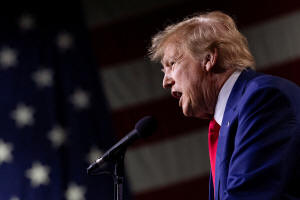US Supreme Court to hear Trump appeal of Colorado ballot
disqualification
 Send a link to a friend
Send a link to a friend
 [January 06, 2024]
By Andrew Chung and John Kruzel [January 06, 2024]
By Andrew Chung and John Kruzel
WASHINGTON (Reuters) -The U.S. Supreme Court on Friday agreed to hear
Donald Trump's appeal of a judicial decision barring the former
president from Colorado's Republican primary ballot, taking up a
politically explosive case with major implications for the 2024
presidential election.
At issue is the Colorado Supreme Court's Dec. 19 ruling disqualifying
Trump from the state's primary ballot based on language in the U.S.
Constitution's 14th Amendment for engaging in insurrection, involving
the Jan. 6, 2021, attack by his supporters on the U.S. Capitol.
The justices took up the case with unusual speed. Trump, the frontrunner
for his party's nomination to challenge Democratic President Joe Biden
in the Nov. 5 U.S. election, filed his appeal on Wednesday. The justices
indicated they would fast-track a decision, scheduling oral arguments
for Feb. 8. The Colorado Republican primary is scheduled for March 5.
The state court, acting in a challenge to Trump by Republican and
unaffiliated voters in Colorado, found him ineligible for the presidency
under a constitutional provision that bars anyone who "engaged in
insurrection or rebellion" from holding public office, barring him from
the primary ballot.
The U.S. Supreme Court did not act on a separate appeal of the state
court's decision by the Colorado Republican Party.
The Colorado case thrusts the Supreme Court - whose 6-3 conservative
majority includes three justices appointed by Trump - into the
unprecedented and politically fraught effort by his detractors to
invalidate his campaign to reclaim the White House.

Trump's spokesperson Steven Cheung praised the court's decision to hear
the case, characterizing the disqualification efforts as "part of a
well-funded effort by left-wing political activists hell-bent on
stopping the lawful re-election of President Trump this November, even
if it means disenfranchising voters."
Colorado Secretary of State Jena Griswold said people in her state and
around the United States "deserve clarity on whether someone who engaged
in insurrection may run for the country's highest office."
Noah Bookbinder, president of Citizens for Responsibility and Ethics in
Washington, a watchdog group representing the challengers to Trump,
added, "We're glad that the Supreme Court will definitively decide
whether Donald Trump can be on the ballot. We look forward to presenting
our case and ensuring the Constitution is upheld."

Many Republicans have decried the disqualification drive as election
interference, while proponents of disqualification have said holding
Trump constitutionally accountable for an insurrection supports
democratic values. Trump faces criminal charges in two cases related to
his efforts to overturn his 2020 loss to Biden.
Trump also has appealed to a Maine state court a decision by that
state's top election official barring him from the primary ballot under
the same constitutional provision at issue in Colorado.
[to top of second column]
|

Republican presidential candidate and former U.S. President
Donald Trump speaks during a rally in Reno, Nevada, U.S. December
17, 2023. REUTERS/Carlos Barria/File Photo

HIGH STAKES FOR SUPREME COURT
While the Colorado case could hamper Trump's bid to win back the
presidency, it also has major implications for the justices. Given
the political nature of the dispute, they run the risk of appearing
partisan whichever way they lean.
Their action will shape a wider effort to disqualify Trump from
other state ballots. Colorado and Maine are Democratic-leaning
states. Nonpartisan political analysts forecast that both are
unlikely to back a Republican presidential candidate in the general
election. But there are efforts underway in other states - including
highly competitive Michigan - that could shape the election's
outcome.
The Colorado ruling marked the first time that Section 3 of the 14th
Amendment - the so-called disqualification clause - was used to deem
a presidential candidate ineligible. Section 3 bars from holding
office any "officer of the United States" who took an oath "to
support the Constitution of the United States" and then "engaged in
insurrection or rebellion against the same, or given aid or comfort
to the enemies thereof."
The amendment was ratified in the aftermath of the American Civil
War of 1861-1865 in which Southern states that allowed the practice
of slavery rebelled in a bid for secession.
Among other arguments, Trump's lawyers have said that Section 3 does
not apply to U.S. presidents, that the question of presidential
eligibility is reserved to Congress, and that he did not participate
in an insurrection.
The Colorado court's decision marked "the first time in the history
of the United States that the judiciary has prevented voters from
casting ballots for the leading major-party presidential candidate,"
Trump's appeal stated.
The Republican and unaffiliated voters who sued to disqualify Trump
from the ballot disagreed. In a filing on Thursday, they emphasized
the lower court's findings that Trump's intentional "mobilizing,
inciting, and encouraging" of an armed mob to attack the Capitol
meets the legal definition in Section 3.
"This attack was an 'insurrection' against the Constitution by any
standard," they said in the filing.
Trump's supporters attacked the Capitol in a bid to prevent Congress
from certifying Biden's election victory. Trump gave an incendiary
speech before the attack, repeating his false claims of widespread
voting fraud.
Biden in a speech in Pennsylvania on Friday cast Trump as a threat
to American democracy, one of the themes of his re-election
campaign. Biden specifically made reference to Trump's speech before
the Capitol riot, whose three-year anniversary is on Saturday.
(Reporting by John Kruzel in Washington and Andrew Chung in New
York; Editing by Will Dunham)
[© 2023 Thomson Reuters. All rights
reserved.]This material
may not be published, broadcast, rewritten or redistributed.
Thompson Reuters is solely responsible for this content.
 |